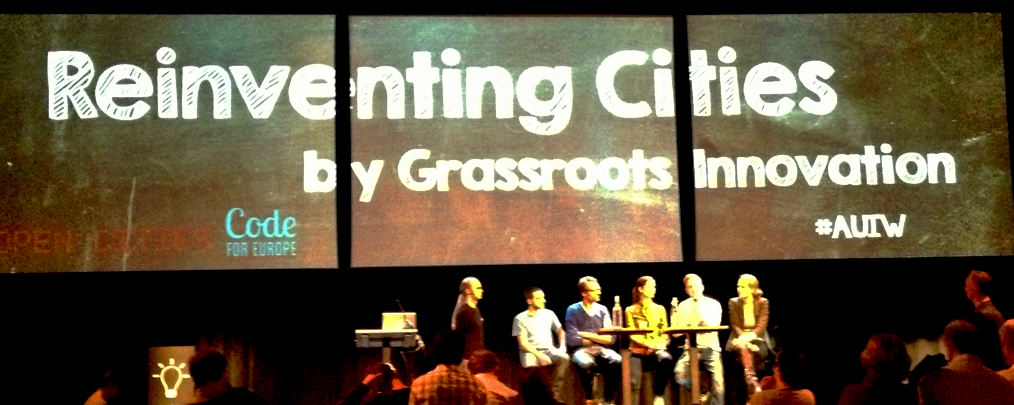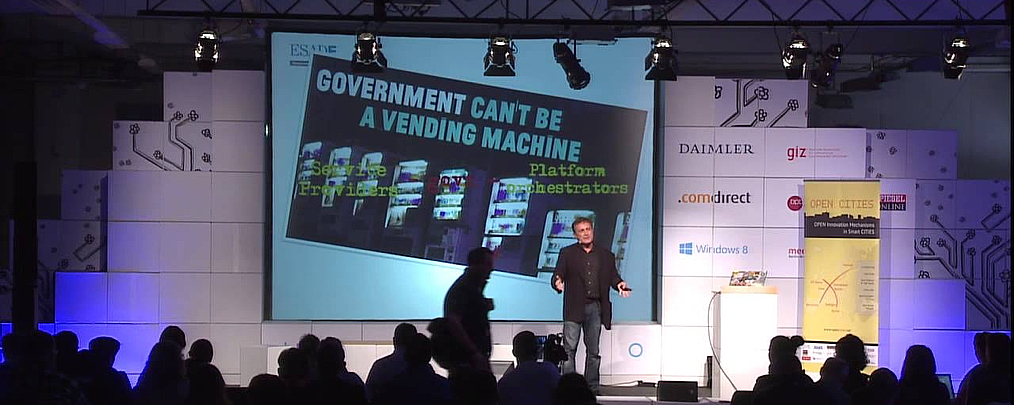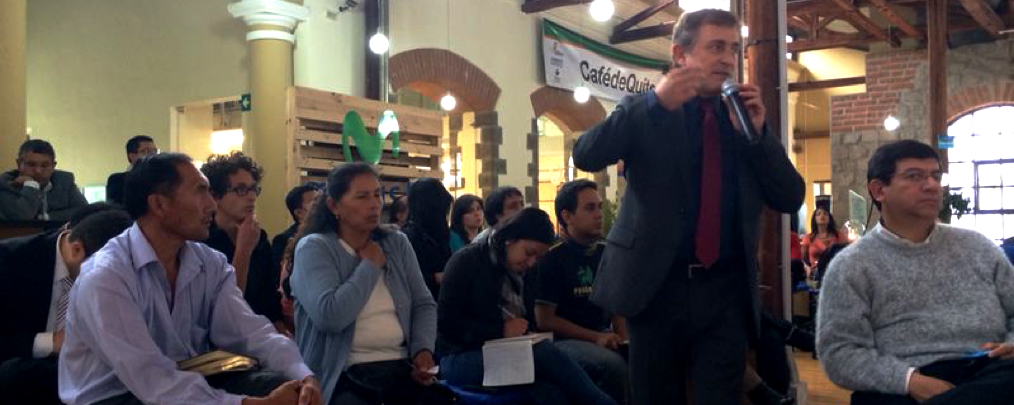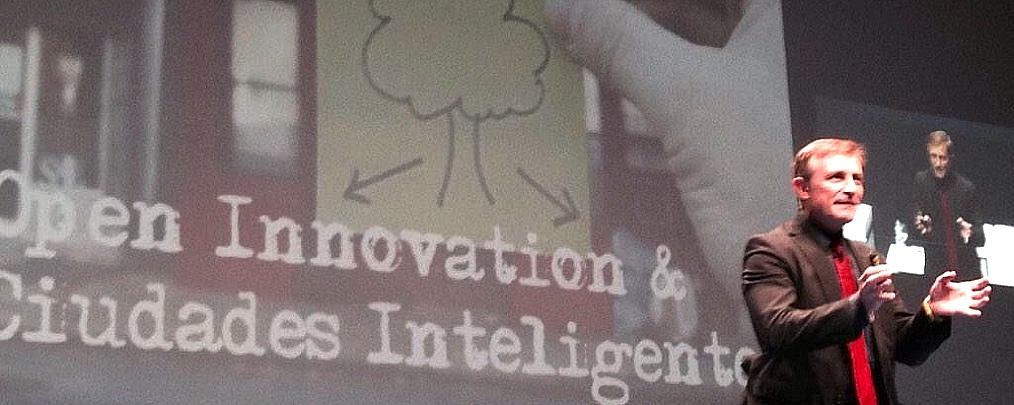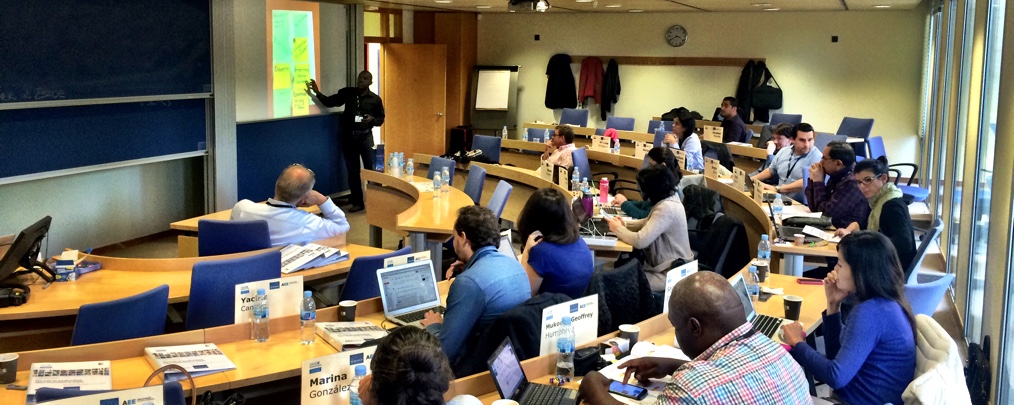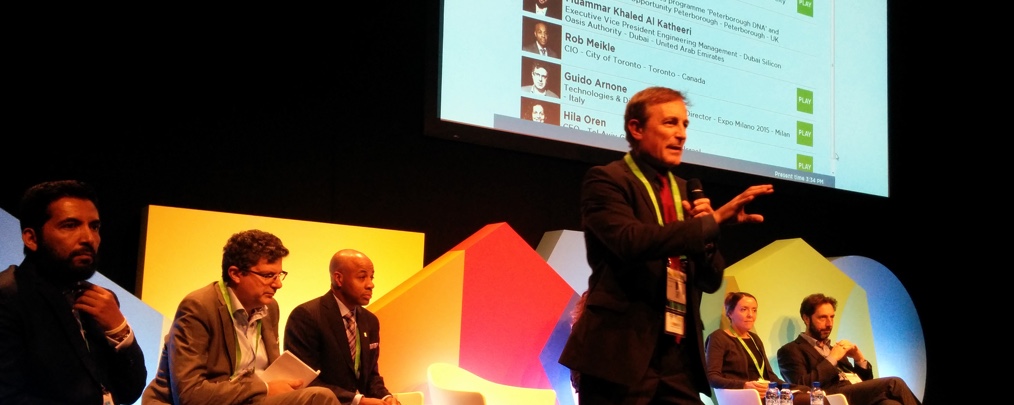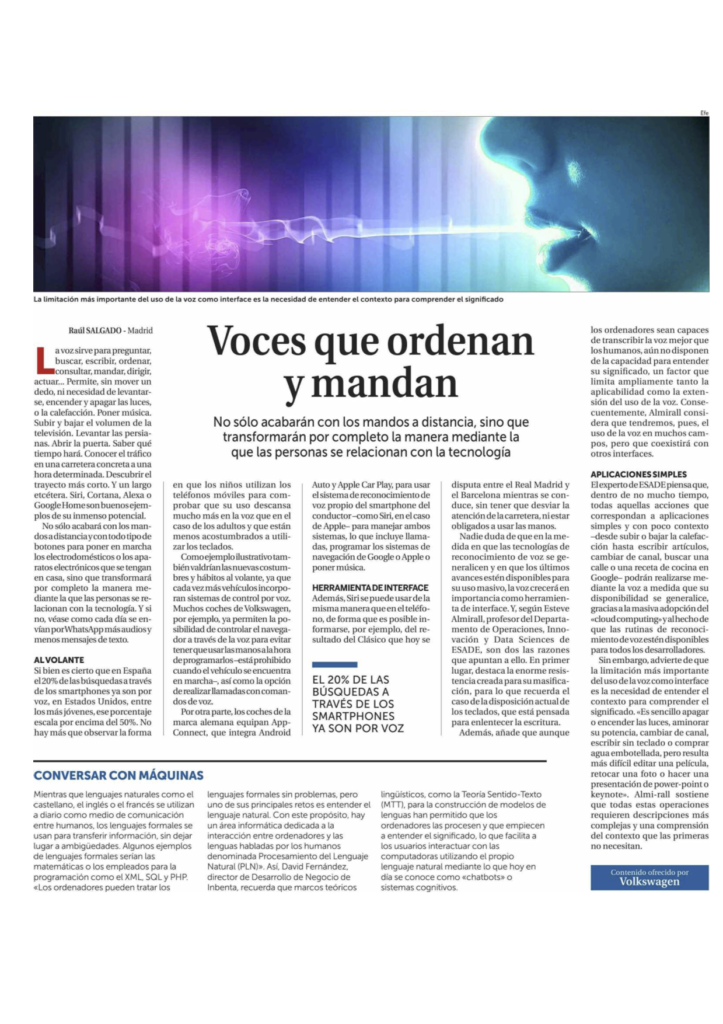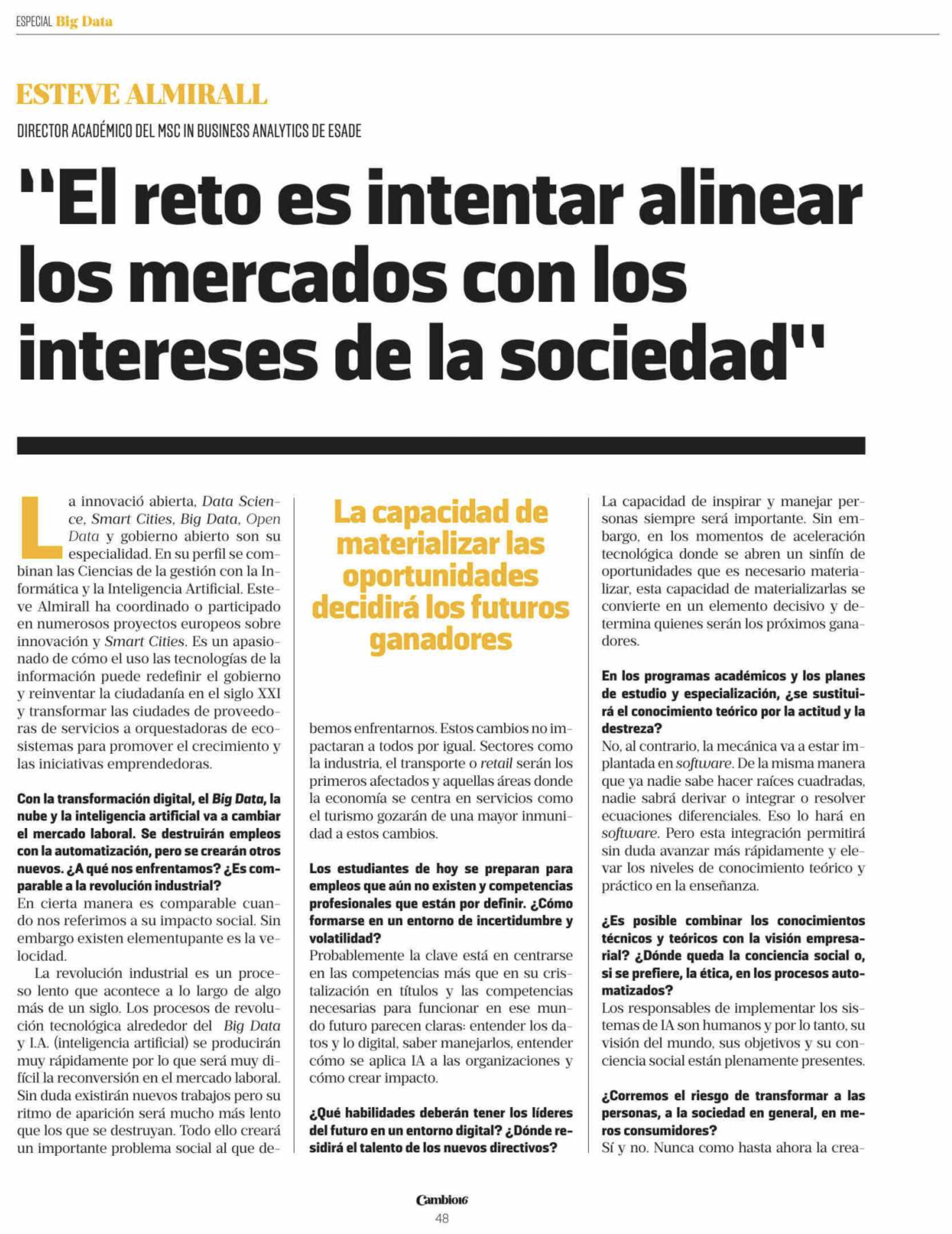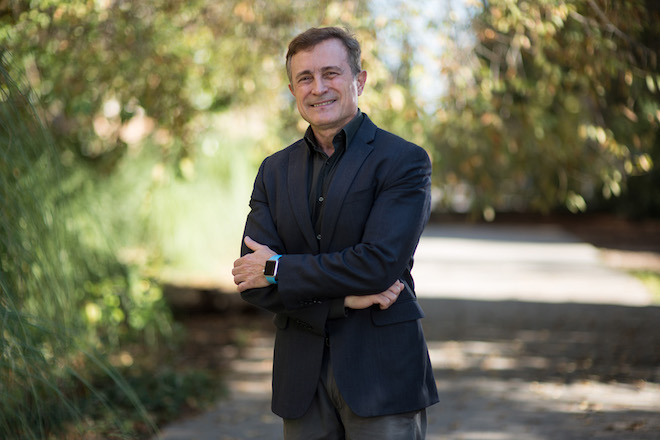Mi contribución a La Razón sobre la evolución de los User Interfaces
http://www.larazon.es/tecnologia/innovacion/voces-que-ordenan-y-mandan-AD17276547
Nació Digital https://www.naciodigital.cat/opinio/16844/intelligencia/artificial/tamb/al/sector/public
«Si no som creadors serem compradors i anirem a remolc de les voluntats i prioritats d’altres»
Potser caldria preguntar-se doncs, què hi ha de diferent aquesta vegada? I per què això és important?
Last Thursday, November 23, 2017 we had our second session of the Speaker Series. In this occasion was about Smart Cities and Data in our Master on Science in Business Analytics program.
Data is starting to have its own role in the field of Smart Cities. Since quite some years we talk of Open Data and its potential to unleash new and novel apps, but in this occasion we wanted to focus more on Big Data and Data Analytics in Cities. This is a topic that is very link to many others that we wanted to explore with the help of 4 knowledge speakers.
First Igor Calzada from the University of Oxford, discussed the processes of Data Devolution in Europe. How Data and data governance is progressively being decentralized and competences devolved to nations, regions or cities. Related concepts such as unplugging were extensively discussed around the case of four European cities.
Carles Carrasco from Eixos and IESE business school presented the linkage between Data and the Digital Transformation that the Public Sector in general and Cities in particular so urgently need. Together with this transformation already very well understood in the private sector, a new one is emerging: The Analytical Transformation that aims to make our cities Data Driven.
Gregori Mora from Diputación of Barcelona showed us some Big Data projects in action and presented an IoT platform, Sentilo, widely used in Barcelona. This is one of the first examples of and Open Source IoT platform built ground up by cities.
Rosa Paradell, from i2Cat, an organization of the Technical University of Catalonia presented some of the ambitious projects that they are working on Big Data and IoT, ranging from intelligent traffic lights, to connected cars or trash cans that communicate.
As always, before the Speaker Series I had the opportunity to have a conversation around the politics of Data with Igor Calzada, here is the result
Last Monday, October 23, 2017 we held our first session of the Speaker Series on Data, Analytics and Cloud in our Master of Science in Business Analytics program.

This first edition was devoted to Visualization. How to visualize complex data is an important part in any data driven strategy. Not only because of need to transmit the discourse in a convincing and compelling manner but also because visualization facilities to uncover and make visible hidden relationships promoting a discussion around them.
If visualization for Analysis is important, when it becomes integrated in the user interface either favoring data exploration or allowing to manage sophisticated AI applications, then it turns out because data visualization becomes the interface itself.
The field is evolving rapidly, developments such as DS3, Python libraries such as Bokeh, Plot.ly or recently Dash are democratizing the capacity of building sophisticated visualizations and the UX around them. However, this is only the beginning, the new developments in AR-VR promise a quantum leap in visualization.
We had three great Speakers in this first edition:
-
-
-
- Mark Schindler – GroupVisual.io
- Alberto Gonzalez – Bestiario bestiario.org
- David Nogué – Eixos eixos.cat
- Victor Pascual Cid – One Tandem – onetandem.com
-
-
Before the Speaker Series I had the opportunity to talk to Mark Schindler, here is the result
A conversation with Beltrán García-Durán, Data Analytics manager at PwC, to know how they see the Data Science and how can a company become a Data-Driven in this sector.
THANKS A LOT PwC and THANKS a LOT to Anna Forastier, PR Director at PwC for facilitating it all !!!
BY: ON MAY 06, 2017
ESADE Professor Esteve Almirall, lecturer in the Department of Operations, Innovation and Data Sciences,
will teach course for the school’s new Master of Business Analytics. Courtesy photo
poetsandquants.com/2017/05/06/esades-master-business-analytics/
Program Name: Master of Business Analytics
School: ESADE
Length of Program: 12 months
Cost: €26,500, or about $28,864
Esteve Almirall’s roots are in the computer industry. He has worked for more than 20 years in executive- and board-level positions in IS, organization, and marketing for consulting, banking, and finance firms; as an entrepreneur he has actively participated in — and founded — several startups in the field. So it’s easy to see where he developed the core belief he brings to his current role as lecturer in ESADE’s Department of Operations, Innovation, and Data Sciences, and director of the school’s new MSBA: Business schools must take the lead in the digital revolution.
‘I believe that in a digital world, in a world that is transforming itself more and more into software, business schools cannot be absent and should be not only present but have a leading role in this transformation,” says Almirall, who earned an MBA from the University of California-Berkeley Haas School of Business. “Our business schools should train the business professionals of the future and these business professionals will be digital. Coding should become in BSs as common as spreadsheets, and analytics and experimentation the normal way to tackle projects and explore new ideas. Our job is to fully contribute to this transformation!”
That’s the basis for the launch of the Barcelona, Spain school’s MSBA this fall. Almirall believes the future of business lies at the intersection between technology and innovation; he is active and sought after for his expertise in the areas of “smart cities,” innovation ecosystems, innovation in the public sector, and user innovation. And he has coordinated several large EU competitive projects and participated in more than 10 of them as main researcher. Now, Building on ESADE’s years of integrating technology and data science into its programs — and with input from company partners and others — Almirall and the school’s faculty have designed the new MSBA to be a leader in analytics education.
“In our case, launching and planning this program involved many people — it has been truly a team effort,” Almirall tells Poets&Quants. “We started with this program checking the rest of the programs that were available. After, we held interviews with more than 20 companies asking their opinions on what should be there and what they wanted of our graduates. Internal checking and discussion has been extensive, with the involvement of many academics and non-academics from our organization.”
«Com tantes vegades a la història ens trobem que una nova forma d’organització social, clarament millor per a tothom, es veu aturada per la inèrcia, la legislació i els interessos contraposats»
Aquests dies estic a Londres, aquí hi ha uns 120.000 conductors d’Uber i l’empresa s’està plantejant no agafar-ne més per una temporada. Es un mitjà molt popular en totes les seves modalitats: compartit, normal, de luxe, executiu,… Com ben bé a tot arreu els taxistes van portar Uber als tribunals però aquí van perdre, els tribunals varen dictaminar que mentre es paguessin impostos tot era perfectament legal, és clar els paguen i suposen no només uns ingressos importants per l’estat, sinó també una reducció dels subsidis.
Article publicat a Nació Digital http://www.naciodigital.cat/opinio/15181/calen/agencies/nesta
Us heu preguntat alguna vegada com es dissenyen les polítiques públiques o les propostes que sovint apareixen a la premsa? D’on surt la proposta d’una renda bàsica universal, la manera d’implementar les superilles o quines són les polítiques millors per fenòmens com Airbnb? S’ha experimentat i vist què funciona millor i què pitjor, o estem davant d’idees plenes de bones intencions (suposem) però mancades de cap evidència o sigui sense dades?
When I was a student many times I wondered how was a class experience in other universities or Business Schools, particularly the ones that we all admire. With time I got the opportunity to attend classes in many of the most prestigious universities around the world. I learnt a lot with that, both as a student or as a teacher. Still learning and still trying to improve every day.
Thanks to the nice marketing people @ Esade (thanks Lidia & Noemi) I got a recording of one of my classes. It was totally unexpected and I thought it will be a nice idea to share it with you. This class is a short version of a longer one that I normally use as an intro to platforms.
I am certainly not the best professor @ Esade and I really hope not to be the worst, at least I try not to. Still learning and still a lot to learn !!!


